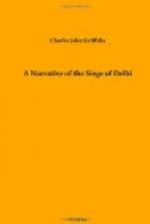The short Indian twilight was drawing to a close when I arrived on the ground, and, without losing time, I drew up the Grenadiers in line, with the two guns a little in advance and on my left flank.
Two sentries were posted in front of the guns, two on the right and left of my small detachment, and two in the rear.
The plain extended before us for miles to the horizon, bare and treeless, without one intervening obstacle.
Evening closed and night came on—a night dark as Erebus, though the stars shone bright and luminous in the heavens. All nature was silent as the grave, and, save for the tramp of the sentinels and the marching away and return of the patrolling parties, for hours we heard no sound.
Before leaving barracks the picket had loaded the guns with grape and the old Brown Bess (there were no rifles in most of the Indian regiments in those far-off days) with ball-cartridge. I had also ordered the men to fix bayonets, and we were thus fully prepared to give a warm reception to any sepoys who might attack us. The arms were piled, and in silence we lay on the ground.
Presently, about midnight, one of the sentinels in front of the guns challenged:
“Who comes there?”
There was no answer, and the cry was repeated, the sentry at the same moment firing off his musket.
The company sprang to their arms, and I called on the sentries in front to retreat under cover of the guns. Almost simultaneously, and before the men could retire, flashes of fire appeared on the plain, and numerous shots came whistling over our heads, while, clear and distinct, a cry rang out, and we knew that one of the sentries had been hit. Close following the first came several straggling shots, but the rascals fired too high, and we had no casualty. I then ordered the men to fire a volley, and the artillery officer at the same time swept his front with grape from the two guns.
After these discharges all was still, and we strained our eyes in the darkness, but could see nothing. Then, taking with me a sergeant and four men, I proceeded to where the sentry had made the first challenge.
We found the poor fellow lying face downwards on the ground, and raising him up, saw that he was quite dead. Slowly and tenderly the body was borne to the picket, and on examination by the light of a lantern, we discovered that he had received a bullet over the region of the heart, and that death, therefore, must have been instantaneous. My heart sickened at the sight; this was my first contact with the horrors of war, and the remembrance will remain with me to my dying day.
The other sentinel was then questioned, and from him we learnt that, peering through the darkness when the challenge was first given, he had seen figures passing in his front across the plain. Soon they halted and fired, and then disappeared, probably having lain down to escape being hit by our men. Hearing this, I sent out a small reconnoitring party, which patrolled the plain for some distance. They returned with the news that all was quiet, and no human being was to be seen. Two fresh sentries were placed in front of the guns, and the men lay down as before, fully expecting another attack.




